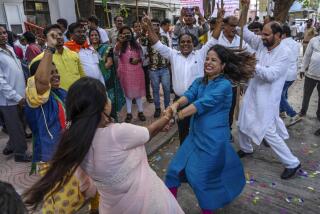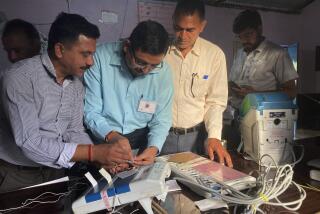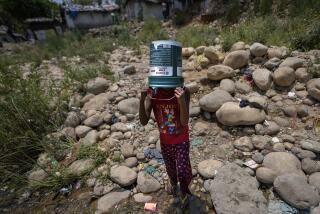Violence, Fall of Key State Government Mar India Vote
- Share via
NEW DELHI — Bloody political clashes marred voting Sunday in India’s parliamentary elections, which took place amid another distraction--the sudden collapse of the government in the country’s most populous state.
Twelve people were killed in factional violence. Nearly 40 others were injured across the nine states that voted.
The turnout was 55%, slightly below average, on the second day of a six-day election, which completed voting for three-fourths of the 543 districts at stake. More than 600 million Indians are eligible to vote.
By Saturday, all but a few votes will be in, and ballot counting begins next Monday.
Most deaths Sunday were reported from the eastern state of Bihar, where 20 people were killed in the first round of voting last Monday.
Gunmen shot and killed a Communist supporter inside a polling booth. Seven other people were killed in shootouts between rival gangs fighting for control of polling booths in different parts of the state. One person caught stuffing bogus ballot papers was beaten to death with sticks by activists of a rival political group.
“Is this democracy? Whoever has more activists around a booth captures and prevents genuine voters,” said Mohammad Idris, of Hajipur town in Bihar, who was turned back by political activists who said his vote had already been cast.
In the neighboring state of Orissa, one police officer was killed when leftist guerrillas attacked a security car carrying guards. Two people died in West Bengal state.
Widespread rigging of votes also was reported, forcing election authorities to suspend polling in several booths.
More than 550 political activists, including two state government ministers, were arrested on charges of disrupting elections.
“People are tired of elections. They have come too soon,” said Madhukar Gawli, a voter in Nagpur in Maharashtra state. The elections are the second in less than three years--a result of inconclusive results from the 1996 vote.
As the voting proceeded, the country’s attention was drawn to Uttar Pradesh, where the government was suddenly toppled overnight.
The maneuver by small-party defectors could have national repercussions because the ousted government was controlled by the Hindu nationalist Bharatiya Janata Party. The BJP is predicted to emerge from the national vote with the most seats, but without a majority. Uttar Pradesh sends 85 members to Parliament, more than any other state.
BJP’s candidate for prime minister, Atal Bihari Vajpayee, declared a hunger strike in protest, alleging that the dismissal was a coup aimed at seizing the state machinery to influence the voting.
A new government led by a tiny splinter party was sworn in late Saturday.
Apathy and fear of violence kept the turnout down in areas besides Bihar, including the tea-growing hills of southern Tamil Nadu state, where 54 people were killed in bombings just before the elections.
More to Read
Sign up for Essential California
The most important California stories and recommendations in your inbox every morning.
You may occasionally receive promotional content from the Los Angeles Times.












